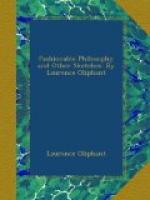Mr Coldwaite. Excuse me; but in discussions of this sort, I think it is most important that we should clearly understand the meanings of the terms we employ. Now I deny that any difference subsists between religion and morality. That any such distinction should exist in men’s minds is due to the fact that dogma is inseparably connected with religion. If you eliminate dogma, what does religion consist of but morality? Substitute the love of Humanity for the love of the Unknowable—which is the subject of worship of Mr Germsell; or of the Deity, who is the object of worship of the majority of mankind—and you obtain a stimulus to morality which will suffice for all human need. It is in this great emotion, as it seems to me, that you will find at once the religion and the morality of the future.
Germsell. From what source do you get the force which enables you to love humanity with a devotion so intense that it shall elevate your present moral standard?
Coldwaite. From humanity itself. I am not going to be entrapped into getting it from any unknowable source; the love of humanity, whether it be humanity as existing, or when absorbed by death into the general mass, is perpetually generating itself.
Mrs Allmash. Then it must produce itself from what was there before; therefore it must be the same love, which keeps on going round and round.
Lord Fondleton. A sort of circular love, in fact. I’ve often felt it: but I didn’t think it right to encourage it.
Lady Fritterly. Lord Fondleton, how can you be so silly? Don’t pay attention to him, Mr Coldwaite. I confess I still don’t see how you can get a higher love out of humanity than humanity has already got in it, unless you are to look to some other source for it.
Coldwaite. Why, mayn’t it evolve from itself?
Germsell. How can it evolve without a propulsive force behind it? The thing is too palpable an absurdity to need argument. You can no more fix limits to the origin of force than you can destroy its persistency.
Lord Fondleton [aside]. That seems to me one of those sort of things no fellow can understand.
Germsell. All you can say of it is that it is a conditioned effect of an unconditioned cause. That no idea or feeling arises, save as a result of some physical force expended in producing it, is fast becoming a commonplace of science; and whoever duly weighs the evidence will see that nothing but an overwhelming bias in favour of a preconceived theory can explain its non-acceptance. I think my friend Mr Herbert Spencer has demonstrated this conclusively.
Coldwaite. Pardon me; do I understand you to say that the mental process which enabled Mr Spencer to elaborate his system of philosophy, or that the profound emotion which finds its expression in a love for humanity, are the result of physical force alone?




